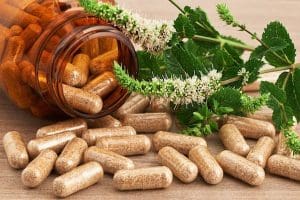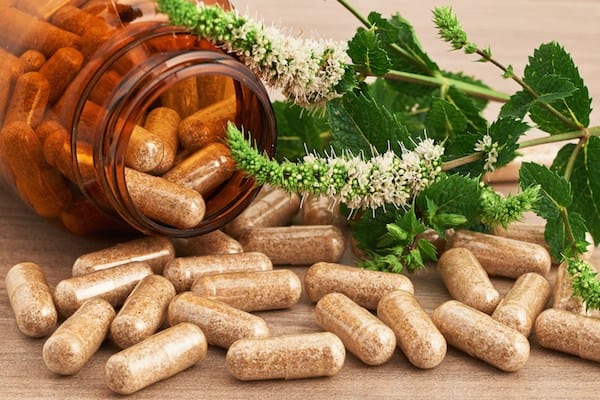
herbal medicinal in capsules
The Bible mentions Balm of Gilead for its medicinal value. Nearly 200 years ago, morphine was first extracted from poppy seeds. Herbal remedies, in one form or another, have been around for eons.
But these ancient herbs have perhaps never experienced a bigger heyday than in 2018. The American population spent close to $7.5 billion on herbal supplements in 2016, and considering that number has now grown for 13 consecutive years, there’s no indication it will do anything but keep going up, up and up.
What does that mean? If you’re into supplements (or even not so into supplements), it’s worth knowing about the most popular botanicals on the market today. Let’s face it: their advertisements are unavoidable, anyhow.
The booming popularity of herbal supplements
Why are more people than ever in developed countries trying complementary and alternative supplements? There could be a number of factors at play. For starters, a natural cure seems like a better idea than pumping your body with pharmaceuticals. (Pharmaceutical overdoses, for instance, killed more Americans in 2016 than the entire Vietnam War.)
Meanwhile, the rise of detailed research into the benefits and side effects of herbal remedies is increasing consumer confidence in the supplement industry across the board—of which herbal supplements is a key submarket.
And extensive marketing by brands makes it hard to ignore these products. The global market value of all kinds of nutritional supplements is now $82 billion, with the U.S. market holding 28% of that pie. That’s a lot of pie. And with the rise of a health-conscious population who wants to stay fit and healthy, herbal supplements have never had a larger—or more captive—audience.
But which herbal supplements should you try?
What starts as a simple Google search can put an endless list of botanical supplements at your fingertips. This is all well and good, except that time is valuable. How do you separate the fads from the genuine products? Here’s a comprehensive list of tried and tested herbal supplements that are immensely popular today—and the science behind that popularity.
Horehound: For the last five years, horehound has held one of the top positions in the herbal dietary supplement market. You might not have heard of this supplement, but if you’ve had an herbal cough lozenge in the past, chances are it contained extracts from this plant in the mint family. Its main benefit is the alleviation of upper respiratory symptoms. Besides being a cough reliever, horehound is also known to aid in digestion and stimulate your appetite.
Cranberry: This evergreen shrub provides extracts that may help prevent UTIs and kidney stones, but it can also be useful for more simple ailments like the flu and common cold. Cranberry was the second-most popular selling herbal supplement in the U.S. in 2017.
Green Tea: The antioxidants present in green tea make it one of the most potent herbal supplements available. Consumption of this extract has been linked to anti-inflammation, anti-bacterial qualities and a reduced risk of cardiovascular disease, to name but a few. Preliminary research found that consumption of green tea has a positive effect on mental alertness and increases dopamine levels. (It’s also one of the most effective ingredients in our top-rated fat burner for men.)
Turmeric: Turmeric extract contains high levels of curcumin, which acts as an antioxidant and has anti-inflammatory properties. Fun fact: when you consume your curcumin supplement with black pepper, the absorption rate goes up by 2000%.
The benefits of curcumin don’t stop there. Studies have shown that it can help protect your heart from cardiovascular complications. On a molecular level, curcumin can help decrease cancerous growth and development.
Boswellia: A small group study found that boswellia extract reduced knee pain in osteoarthritis patients and improved knee flexibility. Similar results were found in rheumatoid arthritis patients. When compared to a prescription drug, a certain boswellia extract was found to be effective against Crohn’s disease. This herbal extract, commonly called Indian frankincense, has also been known to alleviate symptoms of asthma attacks. Given all that, it should come as no surprise that boswellia sales increased by nearly 120% in 2016.
Ginger: Ginger contains shogaol, paradols and gingerols, all known for their anti-cancer effects. This popular cooking ingredient also kicks in an anti-inflammatory response. Whether you’re eating it raw, powdered or adding it to your tea, ginger can also keep morning sickness at bay and reduce muscle soreness.
Garcinia: Garcinia supplements are produced using the fruit’s outer skin. These supplements are popular among consumers because of their supposed weight-loss properties. And this is one weight-loss story that’s not inflated: 6 out of 9 studies found that this herbal extract does have minimal weight shedding effects. That’s why it’s an ingredient in our top-ranked fat burners.
Ginseng: The Asian variety of this herb has short term effects on oxidative stress and anti-inflammation. Korean red ginseng has been found to have a positive effect on cognitive deficiencies in Alzheimer patients.
Before you go completely gaga over herbal supplements, you should keep in mind these products do not fall under FDA drug regulations. Your best bet is to conduct thorough research into a particular herbal product. Make sure you know every ingredient that goes into the powder or pill you decide to consume. And be wary of products that have tons of fillers and very little of the main herbal extract.
If you’re seeking herbal supplements to aid with your fitness or sports nutrition goals, check out the ingredient lists of our favorite fat burners and pre-workout supplements for other herbs that produce proven results.
I’m not just a supplement analyst. I’m an extremely qualified one! I am a Certified Nutrition Coach (CNC) and actually received my certification directly from the National Academy of Sports Medicine. I am also a Nutrition & Wellness Consultant, certified by the American Fitness Professionals Association (AFPA).


